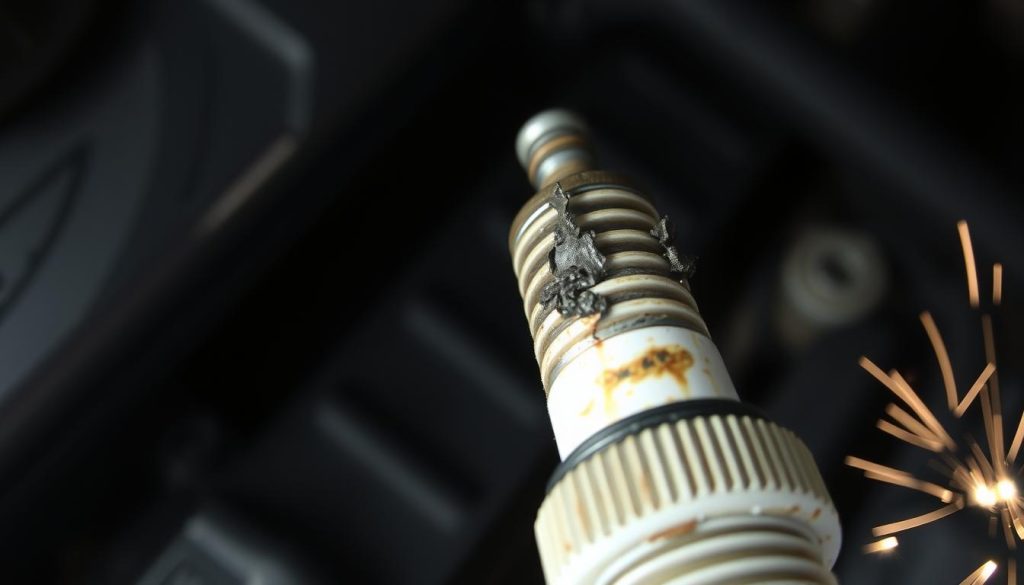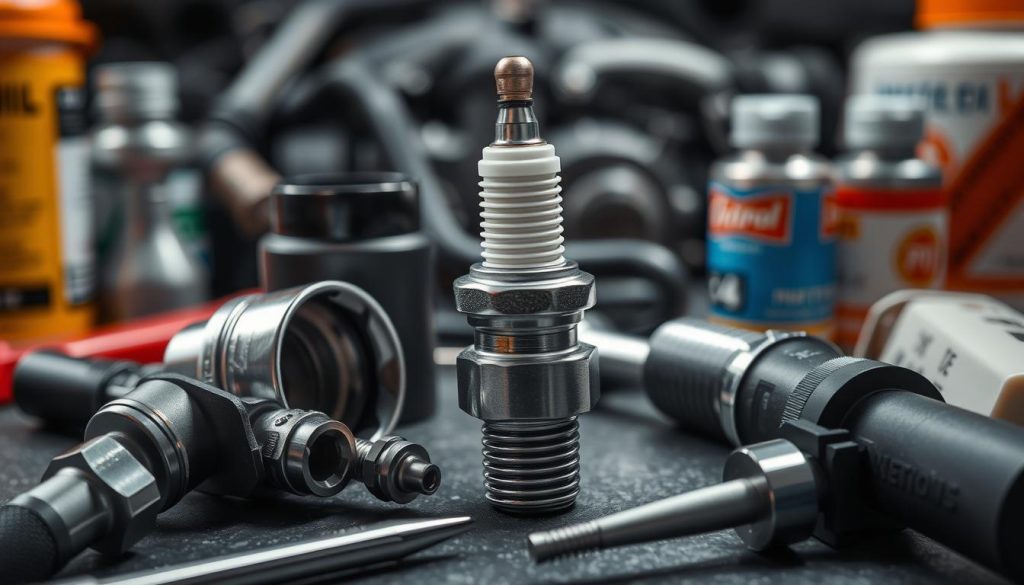Ensuring your vehicle operates at peak performance is a fundamental concern for every driver. A critical component in this endeavor is the timing of spark plug replacement. These small yet essential parts are integral to your car’s efficiency and performance.
The frequency at which spark plugs should be replaced is contingent upon various factors. Grasping these can significantly contribute to maintaining your engine’s optimal condition and averting expensive repairs in the future. Let’s explore the realm of spark plugs and determine their replacement frequency.
It is imperative to conduct regular spark plug inspections to preserve your car’s engine health. By adhering to this straightforward maintenance routine, you can guarantee your vehicle’s longevity and efficiency.
Key Takeaways
- Spark plugs are vital for proper engine function
- Replacement intervals vary by vehicle and driving conditions
- Regular checks can prevent performance issues
- Timely replacement improves fuel efficiency
- Consult your owner’s manual for specific guidance
Understanding Spark Plugs and Their Role in Your Car Engine
Spark plugs are integral to your car’s engine ignition system. These small components are vital for starting your vehicle and maintaining its performance. We will explore the function, types, and signs of proper operation of spark plugs.
What Are Spark Plugs and How Do They Work?
Spark plugs ignite the fuel-air mixture in your engine’s combustion chamber. They generate an electric spark that initiates combustion, powering your vehicle. This spark plug function is essential for efficient engine ignition system operation.
Types of Spark Plugs Available
Various types of spark plugs cater to different engines and driving conditions:
- Copper spark plugs: Affordable, suitable for older vehicles
- Platinum spark plugs: Longer-lasting, ideal for modern cars
- Iridium spark plugs: High-performance, excellent durability
- Double platinum spark plugs: Designed for waste spark ignition systems
Signs of Properly Functioning Spark Plugs
Properly functioning spark plugs indicate:
- Smooth engine operation
- Quick and easy starts
- Optimal fuel efficiency
- Consistent engine performance
Regular inspection and maintenance of your spark plugs are key to ensuring your engine ignition system’s optimal condition. This promotes better overall vehicle performance.
Average Lifespan of Modern Spark Plugs
Modern spark plugs have undergone significant advancements, leading to enhanced durability. Today’s spark plugs, thanks to technological progress, offer superior performance for longer durations. The era when drivers needed to replace spark plugs every 30,000 miles is now behind us.
Cars equipped with copper spark plugs generally last between 20,000 to 30,000 miles. Vehicles utilizing platinum or iridium spark plugs can extend their spark plug replacement intervals to 60,000 to 100,000 miles. Some premium iridium spark plugs even promise lifespans up to 120,000 miles.
“Today’s spark plugs are engineering marvels, designed to withstand extreme conditions and last longer than ever before,” says Mike Johnson, a certified automotive technician.
While these extended lifespans are noteworthy, it’s essential to acknowledge that durability can vary. Your driving habits, the type of vehicle, and maintenance practices all influence spark plug longevity.
| Spark Plug Type | Average Lifespan (miles) |
|---|---|
| Copper | 20,000 – 30,000 |
| Platinum | 60,000 – 100,000 |
| Iridium | 80,000 – 120,000 |
To extend your spark plugs’ lifespan, adhere to the manufacturer’s recommended replacement intervals. Regular maintenance is key to ensuring optimal performance and early detection of any issues.
Warning Signs That Your Spark Plugs Need Replacement
Your car’s spark plugs are vital for engine performance. Spotting spark plug failure symptoms early can prevent expensive repairs and maintain your vehicle’s efficiency. Here, we’ll discuss common indicators that suggest it’s time for a spark plug replacement.

Engine Misfiring and Rough Idling
Engine misfiring is a clear sign of spark plug failure. It happens when one or more cylinders fail to ignite correctly. You might feel a jerking motion while driving or notice your car vibrating when stopped. These symptoms often result in rough idling, where your vehicle shakes excessively at a stand.
Decreased Fuel Efficiency
Worn spark plugs can lead to more frequent gas station visits. They cause fuel efficiency problems by failing to ignite fuel efficiently. This results in your car needing more gas to maintain power, significantly increasing fuel costs.
Starting Problems and Engine Hesitation
Faulty spark plugs can make starting your car difficult. You might hear the engine struggle to start multiple times before it roars to life. Once on the road, you may experience engine hesitation – a brief pause or stumble when accelerating. These symptoms indicate serious engine performance issues that require immediate attention.
Unusual Engine Sounds
Be attentive to unusual engine noises. Rattling, pinging, or knocking sounds often signal misfiring spark plugs. These sounds are your car’s way of alerting you to the need for a spark plug check-up.
| Warning Sign | Possible Cause | Action Required |
|---|---|---|
| Engine Misfires | Worn Spark Plugs | Immediate Inspection |
| Poor Fuel Economy | Inefficient Combustion | Check Spark Plugs |
| Hard Starts | Weak Spark | Test Ignition System |
| Unusual Noises | Misfiring Cylinders | Diagnostic Scan |
Identifying these warning signs early can prevent minor spark plug issues from becoming major engine problems. If you notice any of these symptoms, it’s advisable to have your spark plugs checked by a professional mechanic.
Factors Affecting Spark Plug Longevity
Understanding the factors that contribute to spark plug wear is essential for maintaining your vehicle’s performance. Various elements influence the longevity of your spark plugs, affecting your car’s efficiency and reliability.
Driving Conditions and Habits
Your driving habits significantly impact the lifespan of your spark plugs. Short trips prevent engines from reaching optimal temperature, leading to carbon buildup. Aggressive acceleration and frequent stop-and-go traffic increase wear. In contrast, highway driving can extend spark plug life due to consistent engine temperatures.
Fuel Quality Impact
The impact of fuel quality on spark plugs is often overlooked. Low-grade fuel can leave deposits on spark plug tips, reducing their effectiveness. Premium fuels with cleaning additives help maintain spark plug condition, potentially extending their lifespan.
Engine Type and Design
Engine specifications play a role in spark plug longevity. High-performance engines often require more frequent replacements due to increased stress. Newer engine designs with advanced materials and cooling systems can help spark plugs last longer.
| Factor | Impact on Spark Plug Life |
|---|---|
| Short trips | Decreases lifespan |
| Highway driving | Increases lifespan |
| Low-grade fuel | Decreases lifespan |
| Premium fuel | Increases lifespan |
| High-performance engine | Decreases lifespan |
By considering these factors, you can better predict when replacements are needed and take steps to extend their life.
Manufacturer Recommendations for Spark Plug Replacement
Car manufacturers offer specific guidelines for spark plug replacement within their vehicle maintenance schedules. These recommendations are essential for maintaining your engine’s performance and efficiency. Most automakers advise changing spark plugs every 30,000 to 100,000 miles. This interval varies based on the vehicle model and the type of spark plugs installed.
To determine the recommended spark plug replacement intervals for your car, refer to your owner’s manual. This resource provides detailed information on your vehicle’s maintenance requirements. If you cannot find your manual, many manufacturers offer online versions or mobile apps with this information.
Always follow your car’s specific maintenance schedule to ensure optimal performance and longevity of your vehicle’s engine.
Below is a comparison of recommended spark plug replacement intervals for some popular car brands:
| Car Brand | Recommended Replacement Interval (miles) | Spark Plug Type |
|---|---|---|
| Toyota | 60,000 – 120,000 | Iridium |
| Honda | 60,000 – 100,000 | Iridium |
| Ford | 60,000 – 100,000 | Platinum |
| Chevrolet | 60,000 – 100,000 | Iridium |
| Nissan | 60,000 – 105,000 | Platinum |
Keep in mind, these intervals serve as general guidelines. Your actual replacement schedule may differ based on driving conditions and habits. Adhere to your car manufacturer’s guidelines and consult a professional mechanic if you are unsure about your vehicle’s specific needs.
Cost Considerations for Spark Plug Replacement
When the time comes to replace your spark plugs, you must consider the cost against the benefits. This maintenance task has significant financial implications. Let’s dive into the financial aspects of this essential maintenance task.
DIY vs Professional Service
Choosing to replace your spark plugs yourself can be cost-effective. The cost for parts typically ranges from $16 to $100 for a set. You will also need tools and time. On the other hand, opting for professional service can be more expensive, usually between $40 to $150 per plug. This includes both labor and parts.
Price Range for Different Spark Plug Types
Spark plug prices differ based on type and quality. The most affordable option is standard copper plugs, priced at $2 to $5 each. Platinum plugs are slightly more expensive, ranging from $3 to $8 each. Iridium plugs, the most costly, can be found for $8 to $25 each. High-performance vehicles often require the pricier options.
Hidden Costs to Consider
Remember to account for hidden costs. If you’re tackling the job yourself, consider the cost of tools like a spark plug socket and torque wrench. For professional service, inquire about any additional charges for diagnostics or disposal fees. Some vehicles may require extra labor to access the plugs, which can increase the overall cost.
| Service Type | Parts Cost | Labor Cost | Total Cost Range |
|---|---|---|---|
| DIY | $16 – $100 | $0 | $16 – $100 |
| Professional | $16 – $100 | $24 – $50 per plug | $40 – $150 per plug |
Benefits of Regular Spark Plug Maintenance
Regular maintenance of spark plugs is essential for your car’s optimal performance. Replacing them on schedule offers numerous advantages, affecting both your vehicle’s efficiency and your financial well-being.
One primary benefit is enhanced engine performance. New spark plugs facilitate efficient combustion, resulting in quicker acceleration and superior engine functionality. This leads to a more pleasurable driving experience and minimizes road frustrations.
Another significant advantage is improved fuel economy. Spark plugs in optimal condition ignite fuel more effectively. This efficiency translates into better gas mileage, leading to substantial savings over time. Such fuel economy benefits are substantial, benefiting those with high mileage.
Regular replacement of spark plugs also aids in reducing emissions. Properly functioning spark plugs ensure complete fuel combustion, producing cleaner exhaust. This not only benefits the environment but also aids in passing emissions tests with ease.
| Benefit | Impact |
|---|---|
| Improved Engine Performance | Smoother acceleration, better overall operation |
| Fuel Economy Benefits | More miles per gallon, cost savings |
| Reduced Emissions | Cleaner exhaust, easier emissions test passing |
Maintaining your spark plugs is an investment in your vehicle’s longevity and performance. Regular care can prevent severe engine problems, potentially avoiding expensive repairs in the long run.
Common Mistakes When Changing Spark Plugs
Changing spark plugs might seem simple, but it’s easy to make mistakes. Let’s look at some common errors and how to avoid them.
Incorrect Gap Adjustment
Spark plug gap adjustment is critical for engine performance. A gap that’s too wide or narrow can cause misfires and poor fuel economy. Use a gap tool to measure and adjust the gap according to your vehicle’s specifications.
Wrong Spark Plug Selection
Proper spark plug selection is key to your engine’s health. Using the wrong type can lead to poor performance or damage. Always refer to your owner’s manual or consult a professional to ensure you’re using the right spark plugs for your vehicle.
Improper Installation Techniques
Spark plug installation errors can cause big problems. Common mistakes include over-tightening, cross-threading, and damaging the electrode. Follow these tips to avoid issues:
- Clean the spark plug well before installation
- Use a torque wrench to tighten to the correct specifications
- Don’t force the plug if it doesn’t thread easily
- Avoid touching the electrode
| Common Error | Potential Consequence | Prevention Tip |
|---|---|---|
| Incorrect gap | Misfires, poor fuel economy | Use a gap tool, check specs |
| Wrong plug type | Engine damage, poor performance | Consult manual or professional |
| Over-tightening | Stripped threads, broken plugs | Use torque wrench |
By avoiding these common spark plug installation errors, you’ll ensure better engine performance and longevity.
How to Extend Spark Plug Life
Extending the life of your spark plugs is essential for maintaining engine performance. By adhering to these spark plug maintenance tips, you can ensure your engine operates smoothly for an extended period.

Regular engine care practices are critical in prolonging spark plug lifespan. Maintaining a clean and well-tuned engine reduces stress on spark plugs. Utilizing high-quality fuel minimizes deposits on plug electrodes.
Adopting good driving habits is vital for protecting your spark plugs. Avoiding frequent short trips allows the engine to reach optimal temperature, preventing carbon buildup on plugs.
- Check and adjust spark plug gaps regularly
- Clean or replace air filters to ensure proper air intake
- Use the correct octane fuel recommended for your vehicle
- Address engine issues promptly to prevent strain on spark plugs
Proper installation is essential for maximizing spark plug life. Ensure correct torque when installing new plugs to prevent damage and ensure optimal performance.
| Maintenance Task | Frequency | Impact on Spark Plug Life |
|---|---|---|
| Engine oil change | Every 3,000-5,000 miles | Reduces oil contamination, extends plug life |
| Air filter replacement | Every 15,000-30,000 miles | Improves air flow, reduces plug fouling |
| Fuel system cleaning | Every 30,000 miles | Prevents deposits, maintains plug efficiency |
By implementing these engine care practices and spark plug maintenance tips, you’ll be well on your way to prolonging spark plug lifespan and ensuring optimal engine performance.
Conclusion
Regular spark plug replacement is a fundamental aspect of engine maintenance. These components, though small, are critical to your vehicle’s performance. By ensuring timely spark plug changes, you can maintain your engine’s efficiency and prevent expensive repairs in the future.
Understanding the optimal timing for spark plug replacement is essential for optimizing your vehicle’s performance. Modern spark plugs may have a longer lifespan, yet adhering to your car’s manufacturer guidelines is imperative. Look out for symptoms such as rough idling, decreased fuel efficiency, or starting issues. These could signal the need for new spark plugs.
Proper spark plug maintenance transcends mere replacement. Selecting the appropriate type, setting the correct gap, and ensuring proper installation are all critical. Whether you tackle the task yourself or opt for professional assistance, incorporating regular spark plug checks into your maintenance routine is vital. This approach guarantees peak engine performance and prolongs your vehicle’s lifespan.

Leave a Reply